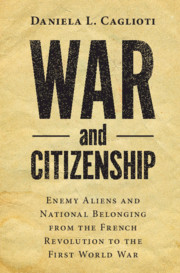 War and Citizenship
War and Citizenship from Part II - The First World War
Published online by Cambridge University Press: 30 October 2020
Chapter 9 deals specifically with the way in which the war affected the notions and practices of citizenship. It does so by switching the attention from enemy aliens to citizens of enemy origins. The chapter concentrates firstly on an analysis and discussion of the naturalization policies adopted by the various belligerent countries during the First World War. It then examines the spread of denaturalization statutes across Europe and the emergence of statelessness, concentrating both on state attitudes and public opinion and on the impact of naturalization and denaturalization policies on people of enemy origin. It also looks past the end of the war at the impact of those policies on interwar developments in inclusion and exclusion. The war played a crucial role in stabilizing differences between citizens and aliens and making them starker. It also imposed markers of identity (nationality, language, religion, ethnicity, “race”) on people, often regardless of their will or choice. In the name of military necessity and national security, authorities were willing to investigate origins and parentage or kinship, religion, language and all the markers that could indicate disloyalty to the nation in arms, thus implementing rigid notions of citizenship/subjecthood.
To save this book to your Kindle, first ensure no-reply@cambridge.org is added to your Approved Personal Document E-mail List under your Personal Document Settings on the Manage Your Content and Devices page of your Amazon account. Then enter the ‘name’ part of your Kindle email address below. Find out more about saving to your Kindle.
Note you can select to save to either the @free.kindle.com or @kindle.com variations. ‘@free.kindle.com’ emails are free but can only be saved to your device when it is connected to wi-fi. ‘@kindle.com’ emails can be delivered even when you are not connected to wi-fi, but note that service fees apply.
Find out more about the Kindle Personal Document Service.
To save content items to your account, please confirm that you agree to abide by our usage policies. If this is the first time you use this feature, you will be asked to authorise Cambridge Core to connect with your account. Find out more about saving content to Dropbox.
To save content items to your account, please confirm that you agree to abide by our usage policies. If this is the first time you use this feature, you will be asked to authorise Cambridge Core to connect with your account. Find out more about saving content to Google Drive.